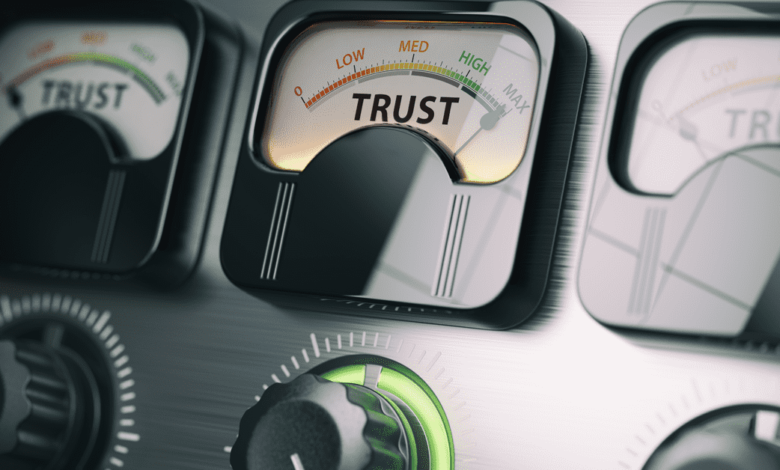Who Egyptians trust most, least when it comes to brands

Trust is one of those intangibles which we as communicators must always focus on. Trust, that notion of one person relying on and believing in a second person, is key to changing attitudes and behavior. But how do you build trust, and what channels should you focus on? These are the questions that we need to answer to be able to do our job of building and protecting reputations. So, where should one begin when looking to build trust?
Based on research by YouGov, which was commissioned by the Middle East Public Relations Association and which included a survey across the six Gulf states (Bahrain, Kuwait, Oman, Qatar, Saudi Arabia, and the United Arab Emirates), Egypt, Jordan, and Lebanon, the place to begin isn’t online, but rather face-to-face. Fake media, less impactful advertising, and third-party advocacy are also reshaping where consumers in the region put their trust.
Here are the research results from Egypt. The research is quantitative, so there are no explanations from those surveyed as to why they chose what they did.
Survey Base
1004 people were surveyed in Egypt, 97% of whom were Egyptian and 3% were ex-pat. When it comes to gender, 51% were male, and 49% were female. Just over 40% were aged between 18 and 29, 21% were between the ages 30 and 39, and 39% were aged over 40.
In terms of geography, it’s no surprise that over a third were Cairo-based, with 36% living in the capital. Of the remainder, 24% live in the Delta, 17% in Alexandria, 16% in Upper Egypt, and the remainder in the Canal Zone/outside of these areas.
In terms of salaries, 30% earn less than US$266 per month, 24% earn between US$266 and US$532, 17% earn between US$533 and US$1,065, 8% earn between US$1,066 and US$2,665, and 3% earn more than US$2,666. Approximately 18% of people refused to disclose their earnings.
Finally, 41% described themselves as single, 47% as married with children, and 6% were married but had no children. The remaining 6% were classed either as other or did not respond.
The Influence of Family, Friends and Third Parties
When it comes to those closest to them, Egyptian respondents said they have an 85% level of trust in face-to-face conversations with friends and family about products and services.
Only 3% of respondents said that they would not trust a face-to-face discussion. Those who displayed the highest levels of trust include respondents earning between US$533 and US$1,065 (90%), those living in the Canal Zone (96%), and those who are married with children (88%).
Trust in social media posts by friends and family about products and services averages at 51%; mistrust comes in at 14%. Trust is most pronounced in those earning above US$2,666 (62%). Those who are between 18 and 24 are least likely to trust such posts (20%), as are those living in Alexandria (22%).
Egyptian respondents have a higher trust in third-party endorsements of products and services than most other countries in the region; 62% agreed that they trust third-party endorsements more than what a brand says about its own products and services, compared to 6% who don’t. The highest trust is among those who are earning less than 500 Egyptian Pounds and those who are earning over 10,0001 Egyptian Pounds (both 70%), as well as ex-pats (76%).
Trust in Social Media
Egypt’s respondents were torn over social media posts by influencers and people with lots of followers on products and services; 32% said they found such posts trustworthy, and 31% said they found them untrustworthy. Men were much more likely to be trustworthy (37%) than women (27%). Those who are earning between US$1,600 and US$2,665 also had the most trust (51%) in such posts. The least trusting were ex-pats (23% for, 43% against).
Unsurprisingly, social media has become a vital source of information for Egyptian respondents; 57% of respondents agreed that it has become more important to them as an information source today than five years back (12% disagreed). This is especially true of younger respondents between 18-24 (63%). However, almost half (45%) have low trust in what they see online.
When it comes to the most popular social media channels for information on goods and services, it may be no surprise that Facebook is the most popular by far (71%), followed by WhatsApp (8%). In third with 8% was the choice of none. It seems that if you want to do social media in Egypt, you have to be on Facebook.
Trust in Media & Advertising
Only two media channels scored higher for being trustworthy than untrustworthy among those polled – they were brand websites (46% versus 18%), and website articles (35% to 24%). All other media scored higher for not being trustworthy, with television and blogs both at 27% (their untrustworthy scores were 41% and 35% respectively), and radio at 30% positive, compared to 35% negative. Respondents weren’t asked why, but it’s probably fair to say that Egyptians have a healthy skepticism of official media, given the events of the past seven years.
Levels of trust in advertising are approximately the same as the media, with billboards being the most trusted (34%), followed by television and radio (both 30%), and finally online at 28%. For online, radio, and television, they’re not trusted more than they are trusted, with negative scores of 32%, 31%, and 33% respectively.
When asked if they trust advertising less today than they did five years ago, 62% agreed and 8% disagreed. Those earning the least (500 Egyptian pounds) trust advertising the least, with a 70% rating. Over two-thirds of respondents (69%), agreed with the statement that so-called ‘fake news’ has lowered their trust in mainstream news media. Only 8% disagreed.



